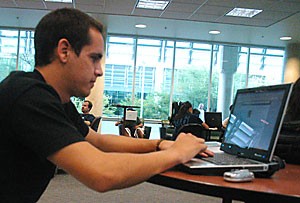If you can’t get past security, you’re going nowhere.
It’s a rule for airports that now applies to the UA residence hall computer network since the Office of Student Computing Resources has implemented a system of controls to prevent users without up-to-date security software from accessing the Internet.
“”I can see why they probably do it, but it’s kind of inconvenient,”” said Myleah Ford, an undeclared freshman.
Ford said she went to the OSCR help desk, which has been busy with students since the start of last week, when the network first began limiting access for its users.
Kate Rehkopf, manager of the OSCR help desk, said the new Impulse Policy Key application gives a warning if a computer’s security is not up-to-date. If the computer continues without being updated, it will be quarantined.
Once quarantined, the computer can access only Windows updating, security software updating and UA Web sites. All other sites are off limits, including those like Desire2Learn, which more than 2,000 courses use as their primary Web site.
Ford, like others, said she had problems bringing her computer up to code after she was kicked off the network. Ford said she went to OSCR to help her get back up.
However, the OSCR help desk was so flooded with requests for help that it was booked with appointments more than a week in advance.
“”When I went to the OSCR help desk for a different reason, like 90 percent of the people there were there because Policy Key was messing things up,”” said Mike McGuire, a math and computer science sophomore.
Rehkopf said OSCR’s goal is to empower students with technology, which includes knowing how to maintain technology.
“”Last week was tough. I don’t think we were doing as good a job talking to them and consulting with them as we probably could have or normally do,”” Rehkopf said.
While students going to the help desk have been cooperative and patient, most are frustrated, said Jon Moser, an aerospace engineering sophomore and OSCR lead technician.
“”I can understand general annoyance, you know, ‘I have classes on D2L, why can’t I get on D2L?'”” Moser said.
Moser said the amount of time it takes to fix a computer varies based on the specific problem, but he has done the job in less than 15 minutes. Rehkopf said some fixes can take as long as three hours.
Jared Baker, a psychology freshman, said he went to OSCR and his computer worked at the help desk, but did not work once he got back to his residence hall.
Rehkopf said there were a few glitches like Baker’s once the system went completely functional, but those issues should be resolved by now.
The network access controls are limited to residence halls for now, but will soon be expanded to include all campus networks.









